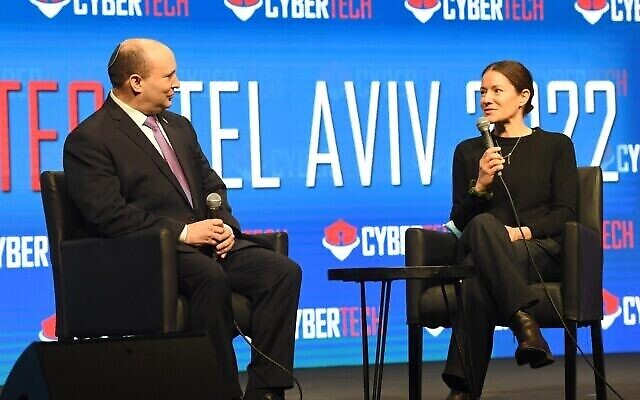Bennett seeks Palestinian tech workers
PM suggests working to pave way for Palestinians to shore up Israel’s tech talent crunch

In response to talent shortages felt across Israel’s well-established tech sector, Prime Minister Naftali Bennett has given “instruction to my government to make it smooth” for Palestinians to integrate into Israeli technology companies, he said at Tel Aviv’s CyberTech conference on Thursday.
“There is another potential pool [of talent], but we’ve got to try it out, and that’s the Palestinians,” he said. “We’ll see. If it works, it would be amazing. I don’t know if it will work, but I’m certainly interested in trying.”
While he did not specify whether his plans were limited only to the West Bank – with which Israel has a more porous border – or include the Gaza Strip, he only mentioned “Ramallah” by name.
Israeli tech – which by the latest available estimates account for 11 per cent of jobs within the country – is facing a severe talent shortage.
“What we do need is people. Israel is hungry for talent. We’ve exhausted the resources of mainstream Israel,” said Bennett.
In addition to Palestinians, Bennett said Israel’s geographical periphery, ultra-Orthodox population, and Arab sector should also be prioritised as new talent pools.

While the prime minister said it would be “right” to integrate Israel’s ultra-Orthodox sector into the military, it’s unrealistic and better to enable them to join the workforce.
“About 10 years ago, everyone was talking about getting the Haredim to serve in the military, which would be right… but it’s not going to happen,” said Bennett. “My dream was the opposite, to let them off the hook at a young age so they can go into the workforce. It’s not fair, but it’s the right thing to do.”
Israel’s diverse Bennett-led coalition passed the first reading of its controversial enlistment bill in late January, meeting fierce opposition from the Knesset’s ultra-Orthodox factions. The bill has moved into a committee for further discussion.
“Pretty soon, we’re going to complete the legislation that’s going to let tens of thousands of young ultra-Orthodox men go out and work – if they want,” Bennett said. “They don’t have to stay in the yeshiva… but they don’t have English and they don’t have math and we’ll have to figure out how to get the smarter ones in.”
The Israel Defense Forces has also recognised the need to bring technological skills onto the battlefield, said Bennett.
“On the operational level, the IDF is now promoting a remarkable hybrid program where folks who are brilliant, boys and girls who are fighters will also be trained in various cyber activities and bring them to a tactical level,” Bennett said.
In apparent indirect confirmation of two 2020 Iranian attacks against Israeli water systems, Bennett cautioned that cyberwarfare can create physical world consequences.
“The future is hybrid warfare, cyber and physical combined. If a hundred years ago we were talking about tanks to tanks, tanks to airplanes, infantry… in the past few decades, we’ve seen a tremendous amount of cyber to cyber: hacking websites, or hacking critical internet infrastructure,” he said.
“We’re seeing a lot more cyber that creates a physical impact. It can change sewage systems. It can change the amount of chloride in the water and poison people. It can have a real-life effect.”

Bennett said that “cyber is simply a new dimension” of weaponry. “I do not agree that per se these are bad weapons. Is a rifle a good thing or a bad thing? If you’re protecting your home, it’s a good thing. If you’re a murderer, it’s a bad thing. A rifle is a tool. The question is how you use the tool and what you’re using the tool for.”
His remarks could be construed as an indirect defense of embattled Israeli spy software company NSO Group. NSO has been under fire both for selling its zero-click exploit technology Pegasus to repressive regimes and for providing an attenuated version of Pegasus to the Israel Police, which has been accused of using it without judicial oversight.
Recognising that Israeli technology is “world lead[ing]” in both offensive and defensive cybersecurity, Bennett added that “with capability comes responsibility, and we have to work out the guidelines on how to use this stuff.”
Israel is still grappling with those parameters in both the private and public sectors.
“The government doesn’t have the authority to command a commercial company to protect itself. And I don’t know that we should,” Bennett said.
“Over the past few months, we had an attack, we knew about the attack, we knew who was going to get attacked,” the prime minister recounted. “We called up the company and we said do what you have to do to close the hole, and they didn’t. And they got attacked.”
Times of Israel

comments